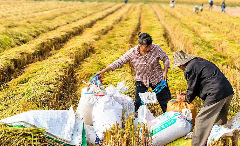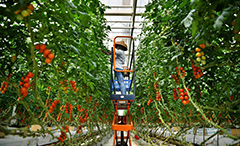Chinese agriculture able to cope with risks
2018-10-02
en.people.cn
China’s stable grain output serves as the ballast stone for national food security, and gives the country confidence to address various domestic and foreign economic risks, said Minister of Agriculture and Rural Affairs Han Changfu.
The country’s grain output is expected to exceed 600 billion kilograms in 2018, the 6th year with a grain yield remaining above 600 million tons, Han said in an interview with People’s Daily about China’s agricultural development and how it supports and influences the national economy.
About 600 million Chinese people are now living in rural areas, indicating a huge market demand, said Han, who is also director of the Office of Central Rural Work Leading Group. With the advancement of rural revitalization and urbanization, rural consumption will increasingly stimulate the national economic growth, he noted.
The minister stressed that China’s rural market has great potential and huge space for development.
He elaborated that in 2017, China’s new industries and new forms of business offered nonagricultural jobs for 28 million rural people.
About 280 million farmers left their homes to be migrant workers, which provided sufficient labor force for urban development and instilled vigor into rural revitalization, he said, adding that leisure agriculture and rural tourism attracted 2.8 billion people last year, creating revenue of 700 billion yuan for rural areas.
China has been opening up its agricultural market, Han noted. The country, with huge agricultural trade volume, has become the world’s largest importer, the second largest trader, and the largest sales destination in terms of agricultural products, according to him.
It is also the world’s largest buyer of such agricultural products as soybeans, sugar and cotton, he added.
China’s total overseas investment in agriculture reached $2.22 billion in 2017, and that in the past five years hit $18 billion, involving over 100 countries.
China’s opening-up in agriculture, according to the minister, has been further promoted thanks to the Belt and Road Initiative. Currently, China has signed more than 120 cooperation agreements on agriculture with over 60 countries and international organizations participating in the initiative, and actively strengthened policy alignment with the latter.
The country has invested over 70 billion yuan in more than 200 agricultural projects in Belt and Road countries with the total trade volume of agricultural products reaching $46.58 billion.
Han pledged that China’s agriculture will open wider to the outside world. The country had a trade surplus in agricultural products in 2001 when it joined the World Trade Organization (WTO), back to when the total amount of agricultural trade was only $27 billion.
However, China now has a trade deficit in agricultural products. Its total trade volume in agricultural products hit $200 billion in 2017, with the import and export of agricultural products amounting to $130 billion and $70 billion, respectively, he added.
China’s trade deficit with the US in agricultural products hit $16.4 billion last year. The country imported agricultural products worth $24.1 billion from the US in 2017, accounting for 19.2 percent of its total agricultural import, while its export of agricultural products to the latter was only $7.7 billion, 10.2 percent of its total agricultural exports.
A fair, equitable and mutually beneficial trade globalization brings a sense of gain to people around the world, while trade frictions will only harm the rights and interests of both sides concerned, said Han, adding that China is confident to address both challenges and opportunities in China-US trade frictions because its economy is resilient and provides enough space to maneuver.


